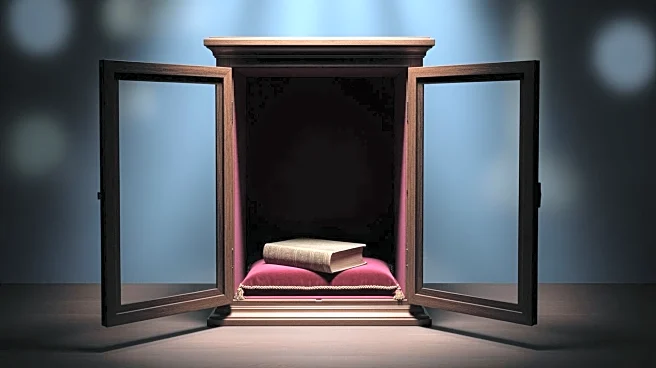What's Happening?
A German auction house, Felzmann, has canceled a planned auction of Holocaust-related items following widespread protests from Holocaust survivors, memorial organizations, and public figures. The auction,
which was scheduled for Monday, included items such as yellow Star of David badges and personal documents of Holocaust victims. Polish Foreign Minister Radosław Sikorski, along with his German counterpart Johann Wadephul, condemned the auction, emphasizing that such items should not be commercialized. The International Auschwitz Committee also criticized the sale, calling it 'cynical and shameless.' The items have since been removed from the auction house's website.
Why It's Important?
The cancellation of the auction highlights the ongoing sensitivity and ethical considerations surrounding Holocaust memorabilia. The sale of such items for profit is seen as disrespectful to the victims and survivors, and it raises questions about the commercialization of historical artifacts. This incident underscores the need for careful handling of Holocaust-related items, ensuring they are preserved in museums or memorials rather than private collections. The public outcry reflects a broader societal commitment to honoring the memory of Holocaust victims and preventing the exploitation of their suffering.
What's Next?
Following the cancellation, there may be increased scrutiny and regulation of auctions involving historical artifacts related to atrocities. Stakeholders, including governments and memorial organizations, might push for stricter guidelines to prevent similar incidents. Poland has demanded that the documents be transferred to the Auschwitz-Birkenau State Museum, which could lead to further discussions on the repatriation and preservation of such items. The incident may also prompt auction houses to review their policies and engage with ethical considerations more rigorously.
Beyond the Headlines
The controversy surrounding the auction raises deeper questions about the commodification of history and the ethical responsibilities of those who handle such sensitive items. It highlights the tension between preserving history and respecting the dignity of those who suffered. The incident may lead to broader discussions on how societies remember and honor past atrocities, potentially influencing cultural and educational approaches to Holocaust remembrance.








